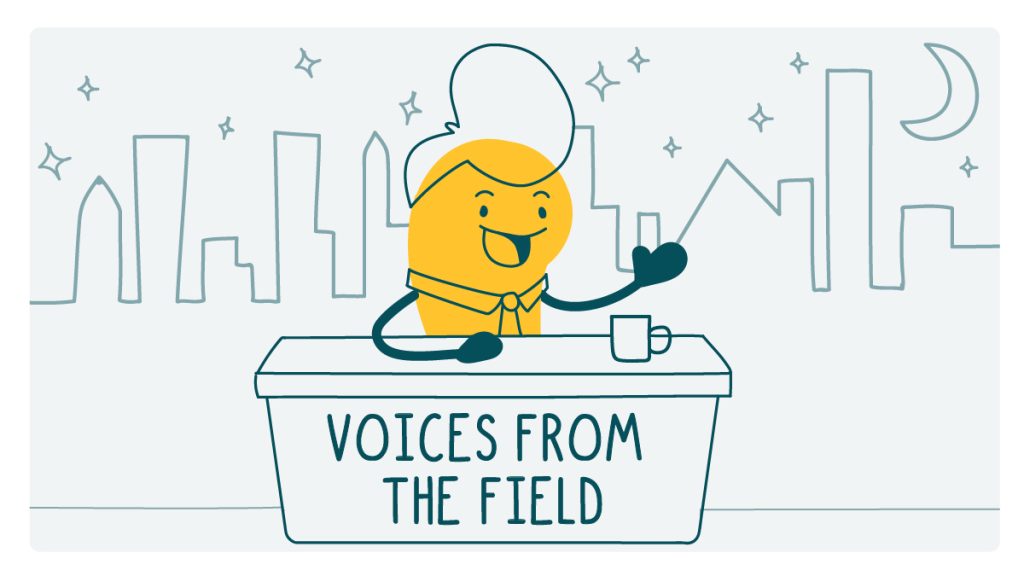
In our interview series “Voices from the Field,” we feature people and organizations that are making a difference in the health comm field. For this post, we had an enlightening conversation with Julia Votto, Associate Director of Innovative Projects at the Eidos LGBTQ+ Health Initiative at the University of Pennsylvania. Eidos works to connect and engage leaders from community, academic, civic, and business spheres to create innovative solutions for LGBTQ+ communities.
Launched in 2022 as part of UPenn’s School of Nursing, Eidos has set an ambitious goal for itself: Transforming LGBTQ+ health. “Even though LGBTQ+ people face significant health risks due to stigma and discrimination, less than 1 percent of funding allocated by the National Institutes of Health goes to projects focused on the health needs of LGBTQ+ people,” Julia says. Eidos is working to level that imbalance — by helping bring to life ideas that can improve the health and well-being of LGBTQ+ people.
What does that look like in practice? “We’re trying to build connections between our students, community members, and organizations that share a similar mission,” Julia says. That means someone might have an idea that could benefit LGBTQ+ people — and Eidos can help connect them with organizations that have the means to make that idea a reality. Earlier this year, we were lucky enough to team up with Eidos on an LGBTQ+ health equity-focused project. With Eidos’ support, CommunicateHealth and Penn LGBTQ Reproductive Health Program clinicians collaborated on a suite of inclusive patient education materials — and an inclusive communication checklist to support clinicians in creating a welcoming environment for LGBTQ+ patients.
Julia notes that a big part of connecting people is to create space for thinking about what LGBTQ+ health looks like. “People in LGBTQ+ communities have always had to create those spaces for themselves because there’s never been a lot of support,” she says. “In a way, that’s what has made us successful — we’re a group of like-minded people working toward a common goal.”
Part of that goal is to promote inclusive language when communicating with LGBTQ+ audiences (and if you know one thing about us, dear reader, it’s that we’re here for that!). Julia shares that when it comes to inclusivity, it can be helpful to build shared values around inclusive communication instead of relying on a fixed set of rules. “Sometimes, organizations we work with ask us: ‘Which term should I use to make this more inclusive?’ But there isn’t always a one-size-fits-all answer. People tend to look for a template, but language is always changing and evolving. That’s why we encourage organizations to establish a set of values to guide their communications.”
And because (inclusive) language is always changing, Julia highlights that it’s important to build up our tolerance for mistakes — and to not let the fear of getting it wrong stop us from trying a new approach. “As we’re all learning how to be more inclusive in our communications, mistakes are going to happen. That’s okay. All we can do is acknowledge it, correct the mistake, and move on.” An iterative approach to inclusive health communication — what’s not to ❤️ about that?
The bottom line: There’s a big gap between the burden of health risks (caused by systemic factors) carried by LGBTQ+ people and the resources allocated to find solutions. Organizations like Eidos are here to change that status quo — and create a healthier, more equitable society for all.
Copy/paste to share on social (and tag us and our friends at Eidos!): Interested in hearing from #HealthComm professionals about their work? Check out this post in CommunicateHealth’s new series “Voices from the Field”: https://communicatehealth.com/wehearthealthliteracy/voices-from-the-field-julia-votto-eidos-lgbtq-health-initiative/ #HealthLiteracy
Browse recent posts